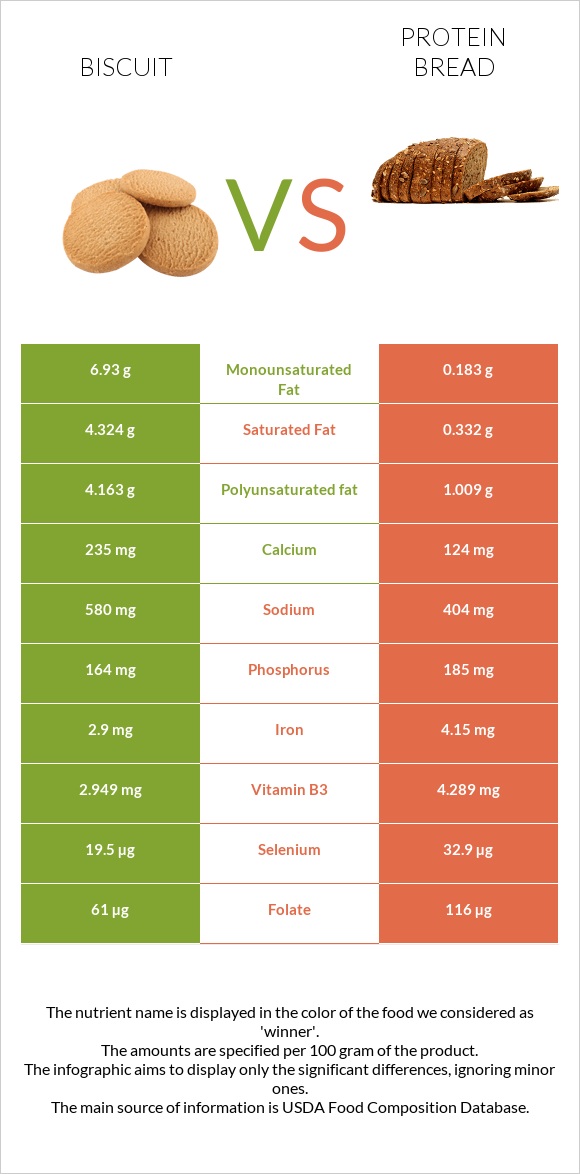Biscuit vs. Protein bread — In-Depth Nutrition Comparison
Compare
How are biscuits and protein bread different?
- Biscuits are higher in calcium; however, protein bread is richer in manganese, copper, selenium, iron, folate, zinc, magnesium, and vitamin B3.
- Daily need coverage for manganese for protein bread is 48% higher.
- Biscuits contain 13 times more saturated fat than protein bread. While biscuits contain 4.324g of saturated fat, protein bread contains only 0.332g.
- Biscuits have a lower glycemic index (44) than protein bread (71).
Biscuits, plain or buttermilk, prepared from recipe and Bread, protein (includes gluten) are the varieties used in this article.
Infographic

Infographic link
Mineral Comparison
Mineral comparison score is based on the number of minerals by which one or the other food is richer. The "coverage" charts below show how much of the daily needs can be covered by 300 grams of the food.
| Contains more CalciumCalcium | +89.5% |
| Contains more MagnesiumMagnesium | +261.1% |
| Contains more PotassiumPotassium | +166.1% |
| Contains more IronIron | +43.1% |
| Contains more CopperCopper | +408.5% |
| Contains more ZincZinc | +237% |
| Contains more PhosphorusPhosphorus | +12.8% |
| Contains less SodiumSodium | -30.3% |
| Contains more ManganeseManganese | +289.4% |
| Contains more SeleniumSelenium | +68.7% |
Vitamin Comparison
Vitamin comparison score is based on the number of vitamins by which one or the other food is richer. The "coverage" charts below show how much of the daily needs can be covered by 300 grams of the food.
| Contains more Vitamin CVitamin C | +∞% |
| Contains more Vitamin B12Vitamin B12 | +∞% |
| Contains more Vitamin B2Vitamin B2 | +27.1% |
| Contains more Vitamin B3Vitamin B3 | +45.4% |
| Contains more Vitamin B5Vitamin B5 | +47.4% |
| Contains more Vitamin B6Vitamin B6 | +102.9% |
| Contains more FolateFolate | +90.2% |
All nutrients comparison - raw data values
| Nutrient |  |
 |
DV% diff. |
| Manganese | 0.378mg | 1.472mg | 48% |
| Copper | 0.082mg | 0.417mg | 37% |
| Selenium | 19.5µg | 32.9µg | 24% |
| Fats | 16.3g | 2.2g | 22% |
| Polyunsaturated fat | 4.163g | 1.009g | 21% |
| Saturated fat | 4.324g | 0.332g | 18% |
| Monounsaturated fat | 6.93g | 0.183g | 17% |
| Iron | 2.9mg | 4.15mg | 16% |
| Folate | 61µg | 116µg | 14% |
| Zinc | 0.54mg | 1.82mg | 12% |
| Magnesium | 18mg | 65mg | 11% |
| Calcium | 235mg | 124mg | 11% |
| Protein | 7g | 12.1g | 10% |
| Sodium | 580mg | 404mg | 8% |
| Vitamin B3 | 2.949mg | 4.289mg | 8% |
| Potassium | 121mg | 322mg | 6% |
| Fiber | 1.5g | 3g | 6% |
| Vitamin B2 | 0.31mg | 0.394mg | 6% |
| Calories | 353kcal | 245kcal | 5% |
| Phosphorus | 164mg | 185mg | 3% |
| Vitamin B5 | 0.285mg | 0.42mg | 3% |
| Vitamin B6 | 0.035mg | 0.071mg | 3% |
| Vitamin B12 | 0.08µg | 0µg | 3% |
| Choline | 18.7mg | 3% | |
| Vitamin E | 0.36mg | 2% | |
| Cholesterol | 3mg | 0mg | 1% |
| Vitamin K | 1.3µg | 1% | |
| Vitamin C | 0.2mg | 0mg | 0% |
| Net carbs | 43.1g | 40.8g | N/A |
| Carbs | 44.6g | 43.8g | 0% |
| Sugar | 2.18g | 1.44g | N/A |
| Vitamin B1 | 0.356mg | 0.36mg | 0% |
| Tryptophan | 0.087mg | 0.148mg | 0% |
| Threonine | 0.211mg | 0.366mg | 0% |
| Isoleucine | 0.273mg | 0.471mg | 0% |
| Leucine | 0.514mg | 0.858mg | 0% |
| Lysine | 0.226mg | 0.372mg | 0% |
| Methionine | 0.132mg | 0.199mg | 0% |
| Phenylalanine | 0.347mg | 0.596mg | 0% |
| Valine | 0.313mg | 0.518mg | 0% |
| Histidine | 0.161mg | 0.271mg | 0% |
Macronutrient Comparison
Macronutrient breakdown side-by-side comparison
Protein:
7 g
Fats:
16.3 g
Carbs:
44.6 g
Water:
28.9 g
Other:
3.2 g
Protein:
12.1 g
Fats:
2.2 g
Carbs:
43.8 g
Water:
40 g
Other:
1.9 g
| Contains more FatsFats | +640.9% |
| Contains more OtherOther | +68.4% |
| Contains more ProteinProtein | +72.9% |
| Contains more WaterWater | +38.4% |
~equal in
Carbs
~43.8g
Fat Type Comparison
Fat type breakdown side-by-side comparison
Saturated fat:
Sat. Fat
4.324 g
Monounsaturated fat:
Mono. Fat
6.93 g
Polyunsaturated fat:
Poly. Fat
4.163 g
Saturated fat:
Sat. Fat
0.332 g
Monounsaturated fat:
Mono. Fat
0.183 g
Polyunsaturated fat:
Poly. Fat
1.009 g
| Contains more Mono. FatMonounsaturated fat | +3686.9% |
| Contains more Poly. FatPolyunsaturated fat | +312.6% |
| Contains less Sat. FatSaturated fat | -92.3% |





